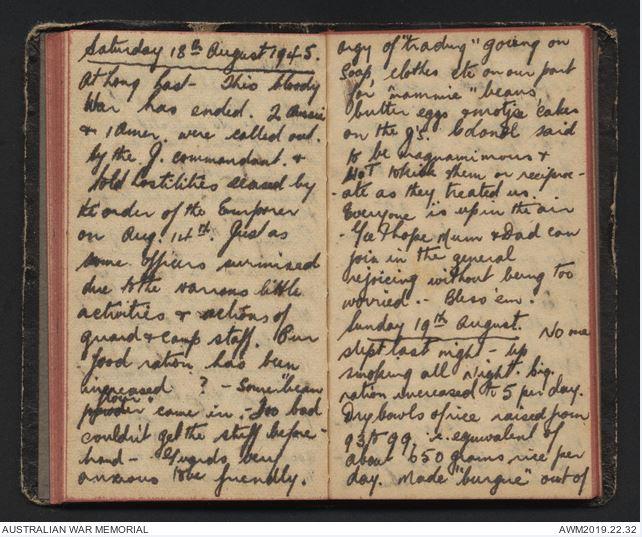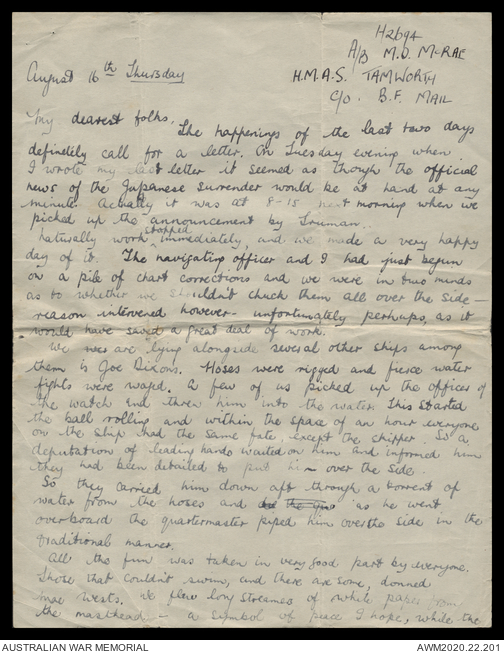Recollections of Victory in the Pacific Day
The announced surrender of Imperial Japan on 15 August 1945 sparked spontaneous celebrations in cities and towns around Australia. Some servicemen and servicewomen were fortunate to join the public in these celebrations, but the majority of those serving marked the occasion in far-flung places. These diverse settings and disparate circumstances surrounding their service shaped how they responded to the historic announcement. The following accounts from records held at the Australian War Memorial reveal how servicemen and servicewomen reacted to Victory in the Pacific (VP) Day.
A crowd of civilians and servicemen celebrate VP Day on the streets of Brisbane, 15 August 1945.
Able Seaman Malcolm Duncan McRae was serving on HMAS Tamworth when United States President Harry S. Truman’s radio address on the Japanese surrender was broadcast on board. In a letter to his family, he described the high jinks that ensued:
Hoses were rigged and fierce water fights were waged. A few of us picked up the officer of the watch and threw him into the water. This started the ball rolling and within the space of an hour everyone on the ship had the same fate except the skipper. So a deputation of leading hands waited on him and informed him they had been detailed to put him over the side. So they carried him down aft through a torrent of water from the hoses and as he went overboard the quartermaster piped him overside in the traditional manner.
Letter from Malcolm Duncan McRae to his family written at sea on board HMAS Tamworth, 16 August 1945.
MaRae went on to detail a day of revelry on HMAS Tamworth culminating with the firing of rockets and flare guns during the night. Easy access to all manner of weapons provided a ready substitute for traditional fireworks, as recalled by Leading Aircraftman Ross Patrick Smith who was stationed in Darwin at the time. Smith joined thousands on Mindil Beach for a barbeque, noting that celebrations continued well into the night and turned rowdy at times with some servicemen firing their rifles. The next morning on parade they were all disarmed.
A photograph of Mindil Beach in Darwin littered with empty beer bottles the morning after VP Day celebrations. (Photographer: William Bruce Copland Mackie)
Responding to a request by The Sunday Telegraph for readers to describe how they celebrated VP Day, Mrs White (née Searle) wrote in with her memories of the day. Serving as a private with the Australian Women’s Army Service at Kapooka Army Camp near Wagga Wagga, White and members of her unit – with pet kangaroo in tow – went to the shared mess hall for a night of singing and dancing. During the evening drinks were shared with the kangaroo until it passed out. It was then dressed in a female uniform and deposited in the bed of a sergeant major. White quipped “Just imagine his shock to find a drunk kangaroo there instead of a real girl.”
Englishman Lieutenant William Albert Tooke served with the Federated Malay States Volunteer Force before being taken a prisoner of war and sent to work on “that cursed railway in Thailand”. In a letter to his cousin written on 23 October 1945, Tooke outlined the final stages of his internment at Kanchanaburi (Kanburi) Camp, noting “the batteries gave out about a month before the end so that the final surrender came like a bolt from the blue.” He subsequently described how the news was broken and the reaction of the prisoners:
9.00 pm [16 August] in comes a Jap major from Bangkok & all hut commanders are sent for. In half an hour they are back & we are told officially. We go mad. We go stark raving mad. We yell ourselves silly. We perform all the gyrations known to gymnastics & then some. A note from a trumpet; we know what that means & an immediate silence ensues in which you could have heard ½ a pin drop. Every man stands rigid & 2,000 of us burst forth into a “King” you could have heard in Bangkok & which reduces most of us to tears.
Lieutenant Jack Lusby Burns, a prisoner of war at Hokkaido Camp in Japan, documented the days leading up to the surrender in his diary. As was the case in many prisoner of war camps, altered routines of Japanese guards, a suspension of work duties and improved rations all fuelled rumours that the show was over, albeit days after the official announcement. His diary entries for 17 and 18 August captured the shifting sentiments in camp:
All officers are convinced that the war is over. I pray to heaven that it is right as I’ve been a p.o.w for 3 years too damn long. The treatment the last few days has eased up considerably. Smoke where we want, no work & some damn good meat soups (compared with what we have been used to.)
At long last – This bloody war has ended. 2 Aussies & 1 Amer. [American] were called out by the J. [Japanese] commandant & told hostilities ceased by the order of the Emperor on Aug. 14th. Just as some officers surmised due to the various little activities & actions of guard & camp staff … Guards being anxious to be friendly … Colonel said to be magnanimous & not to kick them or reciprocate as they treated us. Everyone is up in the air.

Jack Lusby Burns’ 18 August 1945 diary entry detailing how news of the Japanese surrender was announced at Hokkaido Camp. C2148027
The response to the Japanese surrender was muted in many prisoner of war camps; relief seemed to be the prevailing sentiment. For some, even this subdued reaction was tempered by disbelief the war was really over, as recalled by Changi internee Captain Austin Yeats Ellerman in his memoir Austin in the Army – Reminiscences:
Eventually came the great day. We heard on our “news” that the Japanese Emperor had ordered his forces to surrender and that hostilities were to cease. I was given the job of meeting the working parties when they came in during the late afternoon, about 1,000 in all and telling them that “the war was over”. They were tired and grubby and all they wanted to do was have a shower and get ready for the evening meal. One voice from the ranks said “What the hell is he stopping us here for?” When I made the announcement, there were a few cheers, but mostly they couldn’t believe it and one voice said “He is talking through his effing hat”.
In the days after the announcement fellow Changi internee Corporal William Charles Warwick noted in a letter to his father, “I just realised that the hut I am in at present is the quietest I have ever heard it as everyone has their head down and are writing flat out.” Thoughts invariably turned to home and reunions with loved ones regardless of whether they were celebrating on ships, serving in distant places or contemplating the future in prisoner of war camps. Tooke’s description of his reunion with his wife and young daughter encapsulates what many servicemen and servicewomen were longing for:
Nancy was at the Airport here to meet me having wisely left Sally at home. I cannot hope to describe the joy of our meeting – you will easily imagine our feelings. Then home in a Red Cross car to meet Sally. Poor little mite. She was completely overcome for a few minutes & I shall remember all my life the way she just said “daddy” & clung round my neck in silence.
---------------------------------------------------------------------
Please refer to the list below for further information on collections referenced in this article and other recently digitised collections relating to VP Day, Japanese surrender ceremonies and other events recorded by servicemen and servicewomen during the end of the Second World War.
3DRL/7917 - Tooke, William Albert
AWM2016.485.1 - Burns, Jack Lusby (Lieutenant, b.1918 - d.2010)
AWM2017.167.1 - Fleming, Dr Edward Lloyd (Wing Commander, b.1925)
AWM2018.532.1 - Skipworth, John Bertram (Able Seaman, b.1922 - d.2010)
AWM2019.62.1 - Marquis, Leonard Stanley (Flying Officer, b.1916 - d.1993)
PR00499 - Sim, Sydney B.E.M. (Signalman, d.1990)
PR00625 - Letters to Sunday Telegraph
PR00732 - Webb, Ronald Stanley, MID (Captain,b.1919-)
PR01601 - McRae, Malcolm Duncan (Able Seaman, b.1925 - d.1974)
PR02080 - Ellerman, Austin Yeats (Captain, b.1912)
PR03032 - Perry, James Lawrence (Able Seaman)
PR03870 - Sinclair, William Thomas (Able Seaman, b.1920 - d.1977)
PR04306 - Stevenson, Howard Carthew (Able Seaman, b.1925 - d.2006)
PR04515 - Warwick, William Charles (Corporal, b.1917 - d.2007)
PR88/176 - Australian Military Forces
PR90/086 - Savige, Stanley George (Lieutenant General, KBE, CBE, CB, DSO, MC, ED, 2nd Aust Corps, AIF b.1890 - d.1954)


